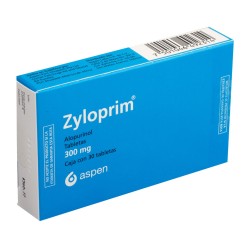Top Class Actions’s website and social media posts use affiliate links. If you make a purchase using such links, we may receive a commission, but it will not result in any additional charges to you. Please review our Affiliate Link Disclosure for more information.

Zyloprim is generically known as allopurinol. The medication is used to decrease high uric acid levels that are present in the body which lead to the condition known as gout. Excess uric acid causes pain and arthritis in the body, and most commonly in the feet.
In addition to treating gout, Zyloprim is also used to treat kidney stones that are made up of high levels of uric acid.
Zyloprim’s method of action is to inhibit xanthene oxidase, the chemical normally present in the human body. When it inhibits xanthene oxidase, the body produces less uric acid.
Although Zyloprim is effective in lowering the uric acid levels in the body, side effects from the medication can be severe if a patient develops Stevens Johnson syndrome. This allergic drug reaction can cause serious damage throughout the body and, in severe cases, can lead to death.
Zyloprim and Stevens Johnson Syndrome
Zyloprim is one of several drugs with a known link to Stevens Johnson syndrome. In addition to anti-gout medications, other medications such as anticonvulsant drugs, pain reliever drugs such as ibuprofen and acetaminophen and certain antibiotics are also associated with an increased risk of developing a serious allergic reaction.
The symptoms of Stevens Johnson syndrome can often be overlooked in its early stages. Initially, when a patient begins to have an SJS reaction, the symptoms appear like the flu or a common cold, with symptoms like sore throat, fatigue, cough, fever, malaise, burning eyes, itching and a general feeling of being unwell.
After this initial period of unwellness, the characteristic rash associated with Stevens Johnson Syndrome begins to surface. The rash typically consists of red or purple blisters that develop in the mucous membranes of the body as well as anywhere on the skin.
In addition to the blisters, skin pain is often felt. The face and tongue my swell and hives may develop.
After the blisters form and spread, the skin begins to die and flake off from the body, exposing the more sensitive layers below. When the skin flakes off, the patient may appear to look like a burn victim.
Stevens Johnson syndrome is a medical emergency, and patients must be hospitalized in order to begin treatment. Many times, patients are treated in the hospital’s burn unit if one is available, or are treated in the intensive care unit.
Treatment focuses on wound care, pain reduction, hydration and nutrition, as there is no cure for SJS.
Although many patients have an SJS reaction upon initially starting a drug, it is important to note that this reaction may develop even after weeks or years of use with no prior issues. Patients taking Zyloprim for any length of time are at an increased risk of developing Stevens Johnson syndrome.
Some patience with SJS recover in several days to several weeks, but others may be hospitalized up to several months before they fully recover.
Some victims of Stevens Johnson syndrome may experience little lasting complications, while others have lasting organ damage, blindness or, in severe cases they may die as a result of the Zyloprim Stevens Johnson syndrome reaction.
Approximately 5 to 15% of patients who develop SJS have a fatal reaction.
Filing a Zyloprim Stevens Johnson Syndrome Lawsuit
If you are a loved one has developed Stevens Johnson Syndrome after having taken Zyloprim, you may be eligible to file an SJS lawsuit to recover economic and non-economic damages related to the condition. An experienced SJS attorney can review your case at no charge and can discuss your legal options in a no-obligation case consultation.
Do YOU have a legal claim? Fill out the form on this page now for a free, immediate, and confidential case evaluation. The Stevens Johnson Syndrome attorneys who work with Top Class Actions will contact you if you qualify to let you know if an individual lawsuit or class action lawsuit is best for you. [In general, SJS lawsuits are filed individually by each plaintiff and are not class actions.] Hurry — statutes of limitations may apply.
ATTORNEY ADVERTISING
Top Class Actions is a Proud Member of the American Bar Association
LEGAL INFORMATION IS NOT LEGAL ADVICE
Top Class Actions Legal Statement
©2008 – 2024 Top Class Actions® LLC
Various Trademarks held by their respective owners
This website is not intended for viewing or usage by European Union citizens.
Get Help – It’s Free
Help for Victims of Stevens Johnson Syndrome
If you or a loved one were diagnosed with Stevens Johnson Syndrome (SJS) or toxic epidermal necrolysis (TEN) after taking a prescribed or over-the-counter medication, you may be eligible to take legal action against the drug’s manufacturer. Filing an SJS lawsuit or class action lawsuit may help you obtain compensation for medical bills, pain and suffering, and other damages. Obtain a free and confidential review of your case by filling out the form below.
An attorney will contact you if you qualify to discuss the details of your potential case at no charge to you.
Please Note: If you want to participate in this investigation, it is imperative that you reply to the law firm if they call or email you. Failing to do so may result in you not getting signed up as a client, if you qualify, or getting you dropped as a client.
Oops! We could not locate your form.












